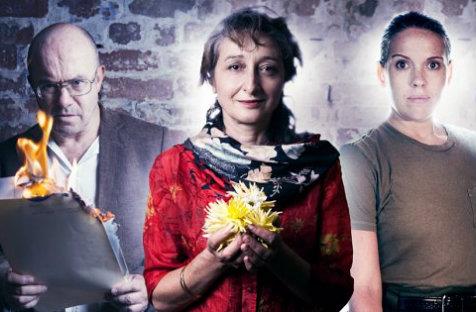A triptych of monologues inspired by real life stories, Palace of the End, by esteemed Canadian playwright Judith Thompson, is a lament for Iraq. The cavernous space at Theatre Works has been truncated to create a screened off area, intimate yet otherworldly, mysterious with lovely blue lighting; it is as though the audience is invited to step into a no-man’s land to hear voices from the underworld. (Importantly, Eugyeene Teh’s set design nicely solves the problem of the often tricky acoustics in Theatre Works.)
The first monologue is performed by Hannah Norris, who is confined upstage to deliver an imagined confession from US Army Pfc. Lynndie England, she of the infamous photos of detainees in Iraq’s Abu Ghraib prison. I found this the most satisfying and complex story: the character is unlikeable, the least sympathetic of the three, she’s confused, delusional almost, a posturing damaged, insecure bully. She is a product, like countless other members of Team America, of a violent, disenfranchised, under-educated culture – the ever-expanding underclass. Joining up brought her into a world where she thought she belonged, could convince herself she was important. Pfc. England became a scapegoat; it was unlucky for her personally that the photographs were made public; as she says, those antics were nowhere near the worst of what goes on. Her being heavily pregnant to a fellow soldier, himself a prison inmate serving eight years, reminds us how this hapless woman is herself a victim of some of the worst manifestations of the army’s hyper-masculinist, inhuman world.
The second monologue, ‘Harrowdown Hill’, gives us the last moments of Welshman David Kelly, former weapons inspector for the Blair government, here performed by Robert Meldrum. As Kelly atones for the hypocrisy of his involvement in the report that was used to justify the UK following the US into war, the eloquence of his farewell to life is moving. Suicide seems his only recourse as complications coil ever more tightly around his life and that of his family. He presents the audience with a philosophical question at the same time, acknowledging how much he is asking of us to witness his death in the woods near his home: ‘Do you say that a soldier who loses his life in the name of freedom, truth and compassion, has killed himself?’
The final monologue, so wonderfully performed by Eugenia Fragos, is from an Iraqi woman, Nehrjas Al Saffarh, who, along with her sons, was tortured in the 1960s by the Ba’ath party’s secret police – known with sickening euphemism as the Instruments of Yearning. (The Palace of the End was a former royal apartment given over to torture). Her story is harrowing to hear, especially knowing that far, far worse happened to others. With strong imagery, her speech portrays a woman who was able to access her faith and a belief in humanity despite her experiences; a belief she expresses beautifully, in strong contrast to the defiantly ugly cynicism (despite her claims to be serving God) of the soldier of the first story and the rueful atheism and resignation of the second. A poignant detail at the end of her monologue takes her soliloquy into magic realism, but also somehow diluted it for me by making it less real; nor did it sit well with the immediacy of the first two stories.
Monologues are tricky things: an audience may be left wondering why a script shouldn’t be heard rather than seen, but this is definitely not the case here. With such powerful deliveries, addressing the audience so baldly, the actors force you to engage. Their limited movements, each performer being fixed to a strict area of the stage, grounds the stories in a sense of grim inevitability. I wasn’t moved to tears but I was moved to despair. A gentle billowing of the dark blue drapes ends the performance, a small reminder that all things pass.
Rating: 3 ½ stars out of 5
Palace of the End
By Judith Thompson
Director: Daniel Clarke
Set design: Eugyeene Teh
Lighting: Rob Sowinsnki
Sound: Russell Goldsmith
Cast: Eugenia Fragos, Robert Meldrum & Hannah Norris
Theatre Works, St Kilda
5 – 16 June





